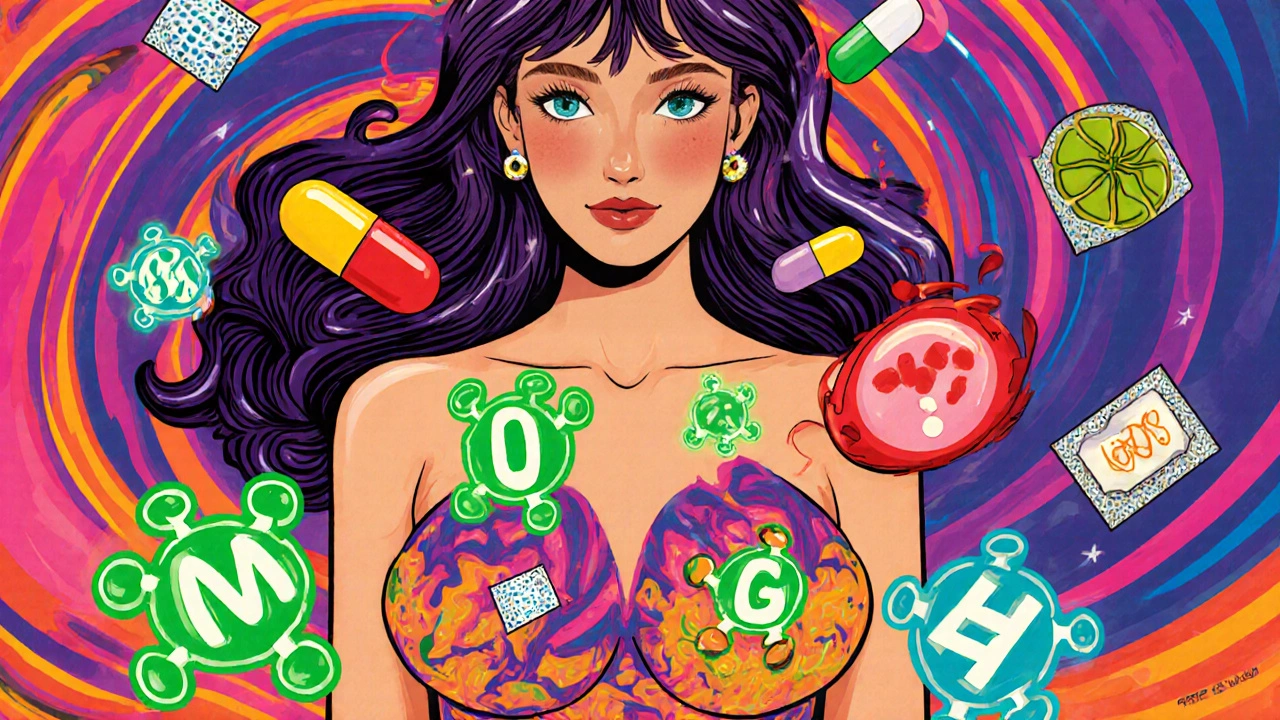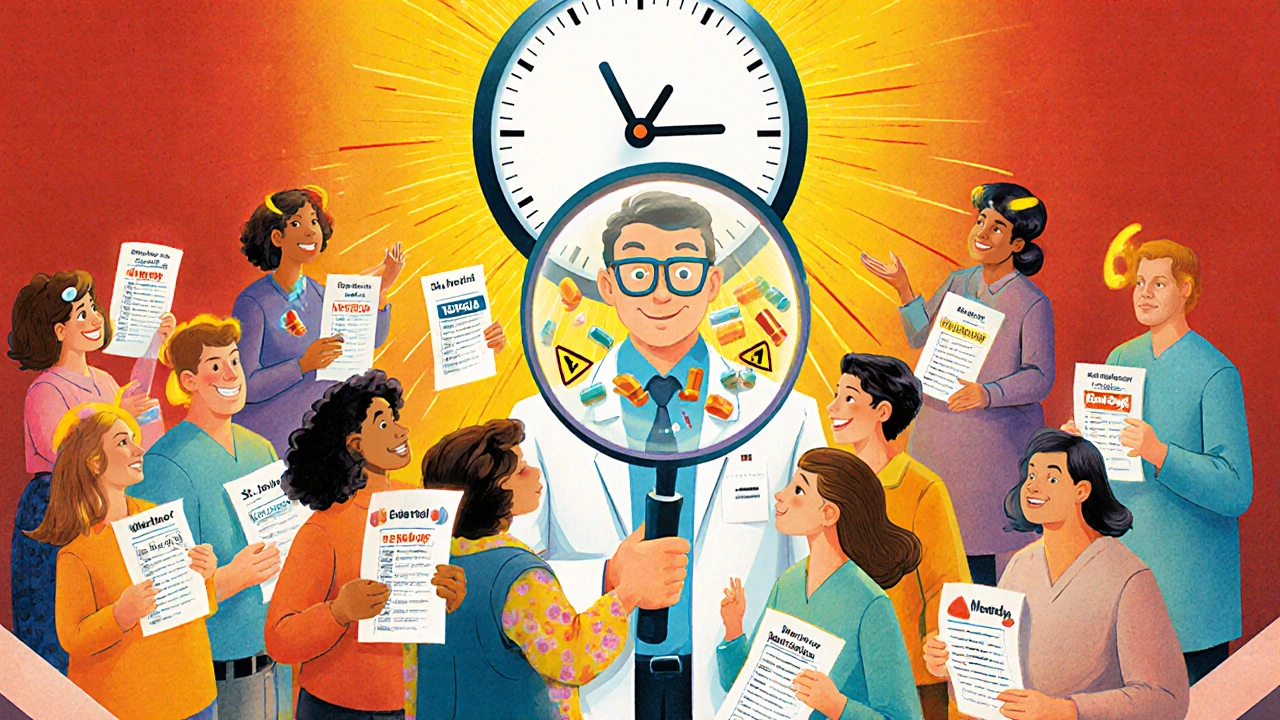Hormone Replacement Therapy: Key Medication Interactions You Need to Know

HRT Medication Interaction Checker
Estrogen boosts the enzyme that breaks down lamotrigine. Levels can drop so low that seizures or mood episodes return. Blood levels should be monitored immediately after starting HRT.
These drugs speed up hormone metabolism. They can make HRT less effective, leading to breakthrough bleeding or returning hot flashes. May require higher HRT doses or different delivery method.
Strong enzyme inducers reduce estrogen levels enough to make HRT ineffective. Even short courses can cause problems.
St. John's wort triggers liver enzymes that break down HRT hormones. NHS explicitly warns it makes HRT tablets "less effective."
Estrogen increases a protein that binds thyroid hormone. This can make blood tests misleading but doesn't indicate thyroid failure.
HRT increases a protein that binds cortisol, making blood tests misleading. Your doctor can't rely on cortisol levels to adjust doses.
Estrogen slightly increases clotting factors. While not always dangerous, it adds risk if you're prone to clots.
When you start Hormone Replacement Therapy (HRT) for menopause, you’re not just adding one medication to your routine-you’re introducing a powerful biological shift that can change how your body handles everything else you take. It’s not just about hot flashes or sleep anymore. If you’re on any other drugs-prescription, over-the-counter, or even herbal supplements-you need to understand how HRT might be quietly affecting them. And the reverse is true too: your other meds can make HRT less effective or even dangerous.
Why HRT Interacts with So Many Drugs
HRT doesn’t work in isolation. Estrogen and progestin, the main hormones in most HRT formulas, are processed by your liver using specific enzyme systems. One of the biggest players is the UGT1A4 enzyme. When estrogen levels go up-like when you start taking Femoston or another estrogen-containing HRT-your liver starts making more of this enzyme. That might sound harmless, but it’s like turning up the volume on a factory that breaks down other drugs. The result? Medications that rely on that same system get cleared from your body faster than they should. This isn’t theory. In 2022, the Netherlands Pharmacovigilance Centre Lareb documented a clear case: a woman taking lamotrigine for depression started HRT. Five months later, her depression worsened. Blood tests showed her lamotrigine levels had dropped by nearly half. Once she stopped HRT, her levels bounced back. This isn’t rare. It’s now a known interaction, and product labels across Europe have been updated to warn about it.Top Medications That Don’t Play Well with HRT
Some drugs are more likely to clash with HRT than others. Here’s what to watch for:- Lamotrigine (used for epilepsy and bipolar disorder): Estrogen boosts the enzyme that breaks it down. Levels can drop so low that seizures or mood episodes return. If you’re on lamotrigine and start HRT, your doctor needs to check your blood levels and adjust your dose.
- Anticonvulsants like carbamazepine, phenytoin, and phenobarbital: These also speed up hormone metabolism. They can make HRT less effective, leading to breakthrough bleeding or returning hot flashes. You might need a higher HRT dose-or a different delivery method.
- Antibiotics and antifungals like rifampicin and griseofulvin: These are strong enzyme inducers. They can reduce estrogen levels enough to make HRT ineffective. Even a short course can cause problems.
- St. John’s wort: This popular herbal remedy for low mood is a major offender. It triggers the same liver enzymes as prescription drugs. The NHS explicitly warns that it can make HRT tablets “less effective.” Don’t assume natural means safe.
- Thyroid medication: Estrogen increases a protein that binds thyroid hormone. This can make your thyroid levels look off on blood tests. Your doctor may need to adjust your levothyroxine dose-not because your thyroid is failing, but because HRT changed how the hormone circulates.
- Corticosteroids like hydrocortisone: HRT increases a protein called CBG that binds cortisol. This makes blood tests for cortisol misleading. If you’re on hydrocortisone for adrenal issues, your doctor can’t rely on cortisol levels to tell if your dose is right. Alternative monitoring is needed.
- Anticoagulants like warfarin: Estrogen can slightly increase clotting factors. While not always dangerous, it adds risk if you’re already prone to clots. Your INR needs closer monitoring when starting or stopping HRT.
Transdermal HRT: A Safer Option for Many
If you’re on multiple medications, your delivery method matters. Oral HRT-tablets and capsules-goes straight to your liver. That’s where most interactions happen. Transdermal HRT, like patches or gels, bypasses the liver. It enters your bloodstream through your skin. That means fewer enzyme disruptions. The NHS confirms that skin patches are “less likely to be affected by other medicines.” That includes St. John’s wort, antibiotics, and anticonvulsants. If you’re taking lamotrigine or other drugs with narrow therapeutic windows, switching from pills to patches could be the simplest, safest fix.
What About Progesterone-Only or Bioidentical HRT?
Many assume progesterone-only therapy is safer. It often is-especially for women who’ve had a hysterectomy and don’t need estrogen. But data is limited. Progesterone doesn’t trigger the same enzyme activity as estrogen, so it’s less likely to interfere with other meds. Still, it’s not risk-free. Some progestins can affect blood sugar or lipid levels, which matters if you’re on diabetes or cholesterol meds. Bioidentical HRT-often marketed as “natural” or “custom-compounded”-sounds appealing. But here’s the catch: there’s almost no reliable data on how these formulations interact with other drugs. They’re not regulated the same way as FDA or EMA-approved products. You can’t assume they’re safer just because they’re labeled “bioidentical.”Hidden Risks: Supplements, Vitamins, and Herbs
You might not think of supplements as drugs, but they act like them. Resveratrol, found in red grapes and wine, has a chemical structure similar to synthetic estrogen. EBSCO Research Starters flag it as a possible interaction risk. Rosemary, often used as a culinary herb or supplement, may speed up liver metabolism of estrogen-potentially reducing HRT’s effectiveness. Even common vitamins can interfere. High-dose vitamin C and E are antioxidants that may alter hormone metabolism. Magnesium can affect how your body absorbs estrogen. Don’t assume “natural” or “safe” means harmless. Always tell your doctor about every supplement you take-even if you think it’s trivial.
What You Should Do Right Now
If you’re on HRT-or thinking about starting it-here’s what to do:- List every medication and supplement you take, including doses and how often. Include herbal teas, CBD oil, and over-the-counter painkillers.
- Bring this list to your doctor before starting HRT. Don’t wait until you feel something’s off.
- Ask specifically: “Could this interact with HRT?” Don’t assume they’ll know. Many doctors aren’t trained in hormonal interactions.
- Monitor for changes: If your mood dips, seizures return, hot flashes come back, or you feel unusually swollen, don’t ignore it. These could be signs of an interaction.
- Consider a patch if you’re on multiple meds. It’s often the safest route.
- Never stop or change doses on your own. If you think something’s wrong, talk to your doctor first.
When to Stop HRT Before Surgery
If you’re scheduled for surgery or will be on bed rest for any reason, your risk of blood clots rises. Estrogen increases clotting factors. The U.S. National Library of Medicine advises stopping estrogen and progestin at least 4 to 6 weeks before major surgery-especially if you smoke, have high blood pressure, a history of clots, or are over 35. This isn’t just a suggestion. It’s a safety protocol. Many patients don’t realize this until it’s too late. If you’re on HRT and surgery is planned, bring it up early. Your surgeon and endocrinologist need to coordinate.The Bottom Line
HRT is not a simple, one-size-fits-all treatment. It’s a powerful hormonal intervention that interacts with dozens of other substances in your body. What works for one woman might put another at risk. The evidence isn’t always strong-but the cases are real. A drop in lamotrigine levels. A return of seizures. A false cortisol reading that leads to under-treatment of adrenal disease. The key isn’t avoiding HRT. It’s managing it smartly. Know your meds. Know your delivery method. Talk to your doctor. And never assume that because something is prescribed or natural, it won’t interfere.When it comes to HRT and other drugs, the safest approach isn’t guesswork. It’s awareness, communication, and careful monitoring.
Tiffany Fox
November 27, 2025 AT 02:00Switched to patches after my lamotrigine levels crashed. Best decision ever. No more mood swings or scary seizures. Just chill.
ka modesto
November 28, 2025 AT 03:02My endo didn’t even mention St. John’s wort until I asked. Wild. Never touch that stuff with HRT. Even if your cousin swears by it for ‘anxiety.’
John Kang
November 29, 2025 AT 09:19Thyroid meds and HRT is a whole thing. My TSH looked like a rollercoaster until we figured out the binding protein thing. Doc didn’t know either. Just go in with a list.
Bob Stewart
November 29, 2025 AT 23:01Transdermal HRT bypasses first-pass hepatic metabolism, thereby minimizing CYP450 and UGT enzyme induction. This is empirically supported in multiple pharmacokinetic studies from the European Journal of Clinical Pharmacology, 2021. Patches are objectively superior for polypharmacy patients.
Simran Mishra
December 1, 2025 AT 18:40I’ve been on bioidentical HRT for 3 years and I swear by it. My compounding pharmacy made me a custom cream with wild yam and black cohosh and I feel like a 25-year-old again. Everyone says it’s not regulated but who cares? I’m not a lab rat. I feel balanced. My sister tried the FDA stuff and cried all day for a month. I’m not buying into Big Pharma’s fear tactics. My hormones are my business.
Samantha Stonebraker
December 3, 2025 AT 04:53There’s something poetic about how our bodies are these intricate, whispering networks - one tiny pill changes the rhythm of everything else. HRT isn’t just hormones. It’s a conductor. And if you’re on lamotrigine or warfarin or even that herbal tea you think is harmless? You’re not just taking meds. You’re playing in an orchestra where someone just turned up the violins. No one warned me. I thought ‘natural’ meant safe. Turns out nature’s got knives too. I’m glad someone wrote this. I wish I’d read it before I started.
Natalie Sofer
December 5, 2025 AT 01:29so i just found out my magnesium supplement might be messing with my hrt?? like?? i thought that was just for cramps?? also can we talk about how no one ever tells you this stuff?? i feel like i got handed a bomb and told to walk away
dayana rincon
December 6, 2025 AT 10:59so like… if I take CBD oil and patches… is that like… HRT + chill mode? 😌
Holly Lowe
December 8, 2025 AT 09:29They say ‘natural’ like it’s a free pass. Rosemary? Resveratrol? Please. That’s just nature’s way of sneaking in a middle finger to your endocrinologist. I stopped everything non-essential the second I started HRT. My skin glows. My brain works. My liver? Still breathing. Worth it.
Kevin Mustelier
December 8, 2025 AT 15:58Wow. A whole article about liver enzymes. How groundbreaking. I bet your doctor also told you water is wet. 🙄
Keith Avery
December 8, 2025 AT 19:10Transdermal HRT? That’s just a band-aid solution for people who can’t handle the truth. Real women take pills. Real women endure the liver’s wrath. You want safety? Don’t start HRT. But if you’re gonna do it, do it right - with the full metabolic chaos. Patches are for cowards.
Cindy Burgess
December 8, 2025 AT 22:50It’s amusing how this article reads like a pharmaceutical pamphlet. The tone is so clinically detached. Where’s the lived experience? Where’s the woman who cried in the pharmacy because her doctor didn’t know about the lamotrigine interaction? Where’s the emotional truth behind the enzyme kinetics? This is data dressed as wisdom.
Luke Webster
December 10, 2025 AT 11:01Every culture handles menopause differently. In Japan, they eat soy and move on. In the U.S., we turn it into a pharmacological warzone. Maybe the real issue isn’t the hormones - it’s how we medicalize everything. But I get it. If you’re on 7 meds already, you need a map. This is that map. And honestly? Thank you for making it so clear.
Tressie Mitchell
December 10, 2025 AT 17:08Bioidentical HRT isn’t ‘unregulated’ - it’s *unfettered*. That’s the point. The FDA doesn’t own your body. If you want to customize your hormones like a fine wine, don’t let bureaucrats tell you it’s dangerous. I’ve been on compounded progesterone for five years. My cortisol levels? Perfect. My energy? Electric. My doctor? Quiet. And I’m not sorry.